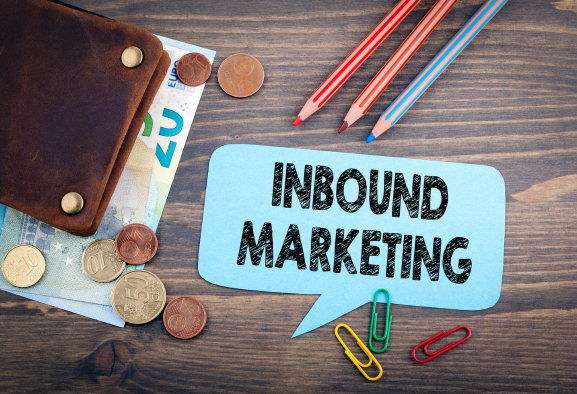Introduction
In the ever-evolving world of marketing, small businesses often face unique challenges. Limited budgets, less brand recognition, and fierce competition make it critical for small enterprises to choose their marketing strategies wisely. Among the various approaches, inbound marketing stands out as a game-changer for small businesses. But what exactly is inbound marketing, and why does it matter? Let’s explore.

What is Inbound Marketing?

Inbound marketing is a strategic approach designed to attract customers by delivering meaningful content and customized experiences. Unlike conventional outbound techniques, such as cold calling or direct mail, inbound marketing draws potential customers through digital channels like search engines, social media, blogs, and email campaigns. The essence of inbound marketing lies in providing genuine value and solutions to your audience, fostering credibility and long-lasting relationships.
If you’re searching for the best inbound marketing agency in Venezuela, inbound strategies can significantly enhance your business’s reach and impact, ensuring success in a competitive market.
The Core Benefits of Inbound Marketing for Small Businesses
One of the most substantial advantages of inbound marketing for small businesses is its cost-effectiveness. Traditional advertising methods, including TV commercials or print media, often come with high costs and uncertain results. Conversely, inbound marketing relies on creating quality content that continues to engage and attract customers over time, reducing expenses while boosting returns on investment.

Another key benefit is enhanced brand visibility. By using SEO techniques and creating engaging content, small businesses can improve their online presence. When potential customers look for the services or products your business offers, your website, blogs, or social media posts can rank higher in search results, thereby increasing brand recognition and trust.
Building trust and authority is another pivotal advantage. Sharing relevant and informative content consistently helps small businesses position themselves as experts in their industry. A trusted brand is more likely to attract loyal customers who prefer your services over those of competitors.
Targeted audience engagement is a fundamental aspect of inbound marketing. Unlike traditional marketing, which often takes a broad and unfocused approach, inbound marketing zeroes in on a specific audience. By analyzing buyer personas, businesses can craft content that resonates with the unique needs and preferences of their target market, ultimately resulting in better engagement and conversion rates.
Additionally, inbound marketing provides measurable results. Tools like Google Analytics, SEMrush, and HubSpot offer insights into website performance, user behavior, and conversion rates. These analytics help businesses fine-tune their strategies and achieve greater success.
Key Components of Inbound Marketing

Understanding the essential elements of inbound marketing is crucial for small businesses. One of the most vital components is content marketing. This involves creating blogs, videos, infographics, and other materials that inform and engage your audience. For example, a local bakery could share tips or recipes online to attract food enthusiasts and potential customers.
Search engine optimization (SEO) serves as the foundation of inbound marketing. By tailoring your website and content to align with search engine algorithms, your business can achieve higher rankings in search results, driving organic traffic.
If you’re looking for the top inbound marketing company in Venezuela, implementing effective SEO techniques tailored to your business needs can yield remarkable results.
Social media platforms are also integral to inbound marketing. They allow businesses to interact with their audience directly, share valuable content, and promote their services. Channels like Instagram, Facebook, LinkedIn, and Twitter can significantly boost engagement and visibility.
Email marketing is another cornerstone of inbound marketing, offering an excellent way to nurture leads and build lasting customer relationships. Personalized and well-crafted emails can keep your audience updated about new products, services, or promotions, encouraging consistent engagement.
Generating and converting leads is a crucial part of the inbound marketing process. By offering valuable resources like eBooks, webinars, or discounts, businesses can gather contact information from potential customers and guide them through the sales funnel to achieve conversions.
Why Inbound Marketing Outshines Traditional Marketing
The non-intrusive nature of inbound marketing is one of its standout qualities. It allows potential customers to discover your business at their own pace, fostering trust and a positive brand image. In contrast to outbound methods, which may feel aggressive, inbound marketing aligns with the preferences of modern consumers who value genuine connections.

Inbound marketing also ensures a lasting impact. While traditional advertising may deliver short-lived results, the content created as part of an inbound strategy can continue to attract and engage audiences long after it is published. This makes it a sustainable and impactful marketing approach.
Relationship building is at the heart of inbound marketing. By offering solutions that address customers’ challenges, businesses can develop loyal customer bases who are likely to recommend their products or services to others.
How Small Businesses Can Get Started with Inbound Marketing

To implement inbound marketing, small businesses should begin by clearly defining their goals. Whether the objective is to increase website traffic, generate leads, or boost brand awareness, having a clear focus will guide your efforts effectively. Researching and understanding your target audience is equally important. By identifying the demographics, preferences, and pain points of your audience, you can create buyer personas to shape your strategy.
Developing a content plan is the next step. A comprehensive content calendar can help organize the creation and publishing of blogs, social media posts, and other content. Consistency is key to building a loyal audience.
Additionally, optimizing your website is critical. Ensure that your site is mobile-friendly, visually appealing, and optimized for search engines to improve user experience and search rankings. Finally, make use of analytics tools to monitor campaign performance and refine your strategy for better results.
Real-Life Example: Inbound Marketing Success for Small Businesses
Take the example of a small local coffee shop. Instead of relying on expensive billboard ads, the shop could focus on inbound marketing by sharing blog posts like “5 Ways to Brew Perfect Coffee at Home” or showcasing beautifully crafted latte art on Instagram. By offering a free “Coffee Lover’s Guide” on their website in exchange for email sign-ups, they can attract new customers and build a loyal community. This approach not only enhances visibility but also establishes the shop as a go-to destination for coffee enthusiasts.

Conclusion
Inbound marketing is not just a trend but a necessity for small businesses looking to grow in today’s competitive landscape. By delivering valuable content, building trust, and engaging the right audience, small businesses can achieve sustainable growth and success.
If you’re searching for the best inbound marketing agency in Venezuela or the top inbound marketing company in Venezuela, now is the time to collaborate with experts who can elevate your business. With limited resources, small businesses can still leverage the limitless potential of inbound marketing to connect with customers and drive results. Begin small, stay consistent, and watch your business thrive.
FAQs:
What is inbound marketing, and how is it different from outbound marketing?
Inbound marketing is a strategy that focuses on attracting customers by creating valuable content and personalized experiences. Unlike outbound marketing, which relies on traditional methods like cold calls and advertisements, inbound marketing draws potential customers through digital channels like blogs, social media, and search engines.
Why is inbound marketing important for small businesses?
Inbound marketing is cost-effective, enhances brand visibility, and builds trust with the audience. By providing targeted and engaging content, small businesses can attract the right customers, improve conversion rates, and sustain long-term growth even with limited resources.
How does SEO contribute to inbound marketing?
Search engine optimization (SEO) is a key component of inbound marketing. It helps businesses optimize their websites and content to rank higher in search engine results, driving organic traffic and increasing the likelihood of attracting potential customers.
What tools can small businesses use to measure the success of inbound marketing?
Small businesses can use tools like Google Analytics, SEMrush, and HubSpot to track website performance, user behavior, and conversion rates. These tools provide insights that help refine inbound marketing strategies for better results.
How can small businesses start implementing inbound marketing?
Small businesses should start by defining their goals and understanding their target audience. Creating a content plan, optimizing their website for SEO, and leveraging social media and email marketing are key steps. Using analytics tools to monitor and adjust strategies ensures continuous improvement.



Leave a Reply